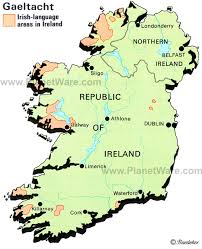Message From the New Irish Language Commissioner - "The Rights Of Linguistic Minorities Are Basic Human Rights"
The newly appointed Irish Language Commissioner, Rónán Ó Domhnaill, is a former political correspondent for Irish Television TG4 and Nuacht RTE. Mr. Ó Domhnaill, aged 38, is a native Irish speaker from An Cheathru Rua, Connemara, in Ireland. Mr. Ó Domhnaill was named in February 2014 to replace outgoing Language Commissioner Seán Ó Cuirreáin. Mr. Ó Cuirreáin announced his resignation in December 2013 in dramatic testimony before the Irish Parliament's Joint Committee on Public Oversight and Petitions in protest over the failure of the current government of Ireland to support the Irish tongue.
Below is the full text of an opinion piece by Mr. Ó Domhnaill appearing today in the Irish Times. The Irish Times is a newspaper that has consistently shown itself to be a supporter of the Celtic tongue of Ireland:
Why Minding Our Language Is A Priority
The thousands of Irish speakers who marched in Dublin last month for their rights weren’t looking for any special treatment. The rights of Irish speakers are recognised in article eight of the Constitution and in the Official Languages Act 2003, while the rights of linguistic minorities are provided for in a number of important international documents including the UN Universal Declaration of Human Rights and Unesco’s Universal Declaration of Linguistic Rights.
Increasingly, it is accepted that the rights of linguistic minorities are basic human rights. As someone who was raised through Irish in the Gaeltacht and is now trying to raise his own children through Irish, I understand the difficulties faced by Irish speakers. While many bodies fulfil their obligations willingly and conscientiously, the reality is that basic services in Irish are often made available as the exception rather than the rule.
Indeed, the notion that Irish speakers are somehow arguing for their rights from a position of privilege is one of the many absurdities that feature in the debate about our national language. Speaking Irish or raising a family through Irish is not an easy option.
Irish speakers live, after all, in a country where the majority speak English, and in the battle to save a minority language, the odds are always stacked in favour of the majority language, especially when the majority language is one of the world’s dominant means of communication.
The provision of language rights helps make the fight for the survival of a vulnerable or endangered language that little bit fairer, as languages often live or die depending on their perceived status and the level of prestige they are accorded.
Powerful Message
When the rights of a linguistic minority to interact with the State in their own language are recognised, it sends a powerful message from the powerful.
In a review of Nicholas Ostler’s Empires of the Word: A Language History of the World, a number of years ago, the author Jane Stevenson suggested it might be time to adapt the old joke that a language is a dialect with an army, when “the real key to survival is for a language to be a dialect with a civil service”. Stevenson wrote: “A class of bureaucrats with the power to defend its monopoly can keep a language going for centuries, as can a set of scriptures, while conquerors come and go.”
This is why Irish speakers, including my predecessor as Coimisinéir Teanga, Seán Ó Cuirreáin, have been calling for the recruitment of more civil servants with Irish. Irish speakers are asking for the right to conduct their business with the State in Irish because the provision of such services is key to the survival of the language, and not because they take a perverse joy in ringing up public bodies only to be put on hold and then told that “the Irish speaker is on holidays”.
http://www.irishtimes.com/news/social-affairs/why-minding-our-language-i...
http://www.transceltic.com/blog/new-language-commissioner-appointed-supp...

- Niall McCarsten's blog
- Log in to post comments





